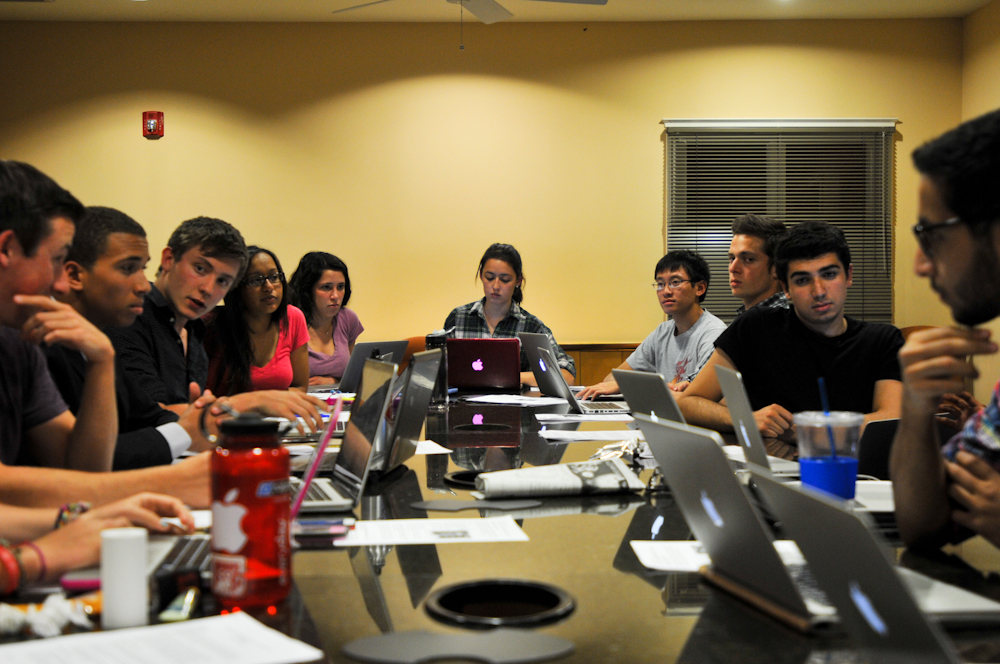With a split 7-7 vote, the 15th Undergraduate Senate decided not to overturn the newly adopted Board of Judicial Affairs (BJA) bylaws. However, the Graduate Student Council (GSC) will be voting on a bill tonight that, if approved, would overturn the very same bylaws.

Although the BJA has the power to unilaterally adopt new bylaws, several senators—in addition to members of the GSC—had expressed concern over both the process by which the BJA adopted the bylaws and the content of the bylaws.
Student Co-Chair of the BJA, Miles Seiver ‘14, attended the meeting on Tuesday evening along with two other BJA student members, prompting debate on whether to overrule the bylaws.
Senator John-Lancaster Finley ‘16 advocated overruling the bylaws in order to enable an informed discussion on them.
“I have been approached with significant concerns from members of the Stanford community that some of these bylaw amendments may be detrimental to students going through the process,” Finley said.
He stressed that starting by overruling the bylaws and then having an informed discussion in committee about which bylaws to keep, remove or amend was the best approach to the situation.
Adam Horowitz M.A. ‘10 Ph.D. ‘14, graduate student member of the BJA, suggested that instead of overruling everything now, the BJA and the ASSU should discuss everything in a separate subcommittee, and come back and overrule the specific bylaws that should not exist.
The BJA student representatives explained that these bylaws could be overruled at any time. Horowitz and Seiver also explained that the changes were intended to make the judicial process more efficient and that extensive time was put into creating and discussing the amendments.
“I don’t care if you veto it or not. The conversation from me is going to happen regardless,” Seiver said. “I know those bylaws came from a community that felt very strongly that these were necessary changes to improve the Stanford community…All that I ask, as a student, is that if you are going to be vetoing these bylaws…[that] you consider whether you fully understand each of those bylaws and what you are vetoing.”
Senator Natasha Patel ‘16—who voted against the overruling of the bylaws—felt that the Senate should trust the judgment of the BJA.
“I chose to vote against overruling the bylaws because I understand that we elect a committee of students as well as faculty to make these decisions,” Patel said. “They’ve had a longer time to assess whether the bylaws are good and we haven’t had as much time and so I’m going to trust their opinion over mine.”
Senator Abby Dow ‘16 also voted against the overruling of the bylaws, stressing that it was unnecessary to deconstruct the current bylaws and instead supported reviewing the bylaws in a joint committee and overruling the specific bylaws at a later time.
Although the Senate was not able to fully overrule the bylaws, the BJA still hopes to work with both the Senate and the GSC in a joint committee.
The creation of the committee will be officially voted on next week, after the Administration & Rules Committee decides how many representatives of the Undergraduate Senate should be included.
Seiver was supportive of the idea of a joint committee, stressing that it was the best way to address this topic.
At the Tuesday night meeting, the Senate also revisited the topic of the Senate Innovation Bill, which was passed last week, in order to address specific concerns about the oversight process.
The bill will allocate $3,000 to each senator to effect change in the Stanford community. Several senators wanted to increase Senate oversight over the way that funds were reimbursed. As a result, the Senate amended last week’s bill by creating an ad-hoc committee to oversee the reimbursement process.
Contact Lucy Svoboda at lsvoboda ‘at’ stanford.edu.
